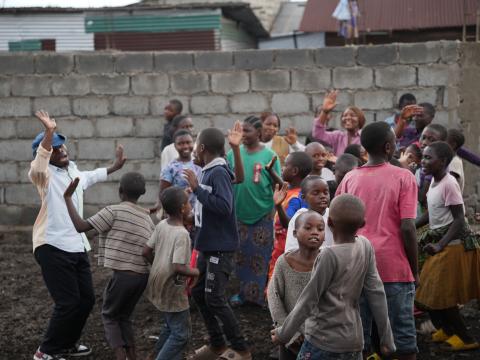DR Congo: “The Nightmares Stopped Here”: How the WALIP Project Heals Broken Children

In eastern Democratic Republic of Congo, where war has stolen childhood from an entire generation, broken lives are finding hope again thanks to crucial support: World Vision’s WALIP project, funded by the US Department of State through its implementing partner, Cœur Sans Frontière. Here are the stories of Alice and Justin, which illustrate the tangible impact of this partnership.
Alice: From Trauma Survivor to Resilient Young Mother
Alice’s ordeal, at just 17 (not her real name), began when she fled fighting to seek refuge in a displacement camp at the age of only 15. “To eat in the camp, we received food thanks to the support of WFP and World Vision,” she recalls. But safety was an illusion. One day, while searching for firewood, she and her friends were attacked.
“On our way back, we came across three boys, one had a machete, another carried a firearm… they eventually caught us and raped us.”
The rape led to a pregnancy. “I refused to have an abortion after they explained the risks to me.” Then tragedy struck again: “We were victims of a burglary during which my father was killed.” Left only with her grandmother, she gave birth in extremely precarious conditions. “To feed or clothe myself, I go to wash people’s clothes.”
The psychological toll was immense.
“I often had nightmares. Sometimes I would dream of the attackers coming to rape me again.”
This was when the intervention of the WALIP project, made possible by US funding, became a lifeline. “World Vision and Cœur Sans Frontière provide me with psychological support,” she says. “Since I spend time and play with friends, I think less about all the problems I experienced… it doesn’t happen to me anymore.”
Today, her eyes are set on the future.
“I am very proud when I look at my daughter. In the mornings, I pray that God will help me find an activity that will allow me to take good care of her. I don’t want my daughter to grow up with as many worries as I had.”
Justin: From Military Exploitation to Lifesaving Psychosocial Support
Justin, 15, endured a similar descent into hardship. After fleeing his village, his parents’ abandonment left him and his brother on the streets. “We slept on a piece of cardboard and were exposed to the rain.” On his own, he turned to a dangerous survival option: “I decided to go and live with the soldiers. I helped them carry their belongings… in return, I received a bit of money.”
Later taken in by his grandfather, he exchanged the streets for domestic violence.
“My grandfather is an alcoholic and mistreats me. All this is a trial I am going through. Sometimes I have dark thoughts.”
For Justin too, the US-funded project marked a turning point. “With the support of Cœur Sans Frontière, my worries seem to be easing,” he notes, finding in the project’s safe spaces the comfort his family fails to provide.
“We talk and share juice and it makes me feel at home. I say thank you and I recommend that these actions continue.”
A Systemic Safeguard Backed by the United States
Victoire Nzambazimana, protection officer for Cœur Sans Frontière, explains the context: “Since we are in a post-conflict zone, this territory of Nyiragongo hosts many returnees and displaced people… This war has heavily affected the region’s economy and household income, which has reduced school attendance rates.”
In the face of this multidimensional crisis, the WALIP project, thanks to US Department of State funding, provides a targeted and structured response. “We are already supporting 440 children, out of a total of 1,140 planned, through games and recreational activities which are the entry point to deeper support,” explains Victoire Nzambazimana. The approach rests on an essential pillar: psychosocial care, embodied in a dedicated listening centre.
“We have this centre where we communicate and actively listen to children. It is a safe space where they can confide and begin to heal their invisible wounds.”
The stories of Alice and Justin show that even in the face of the worst horrors, sustained psychological support can allow a child to start dreaming again.